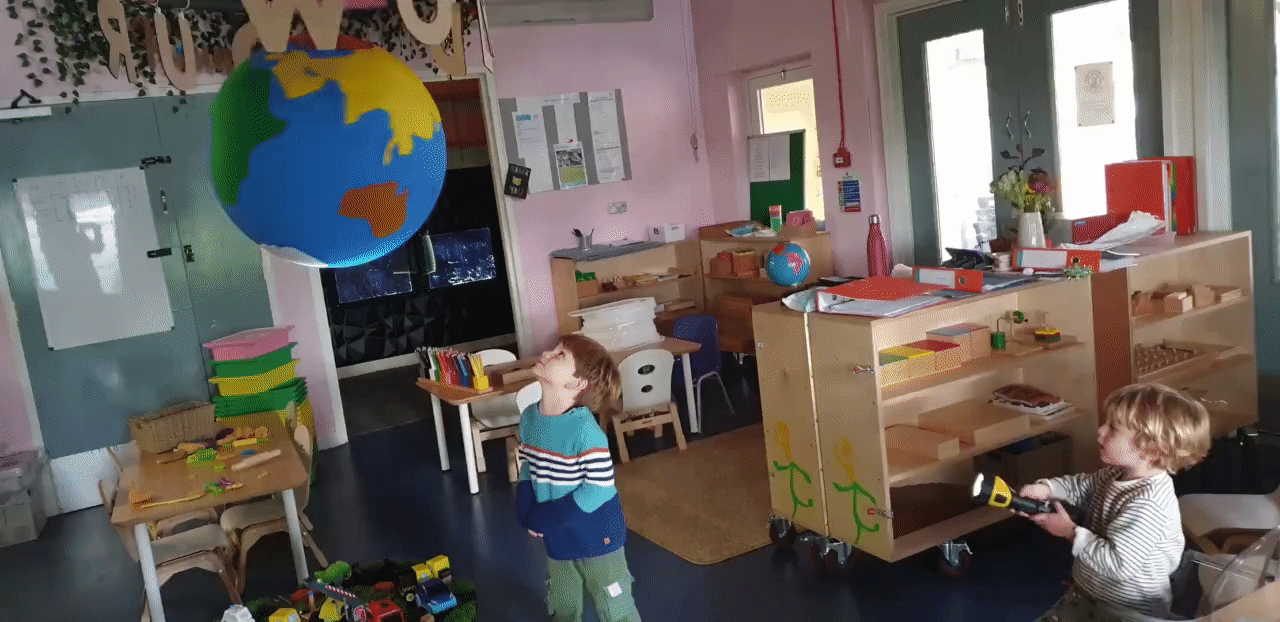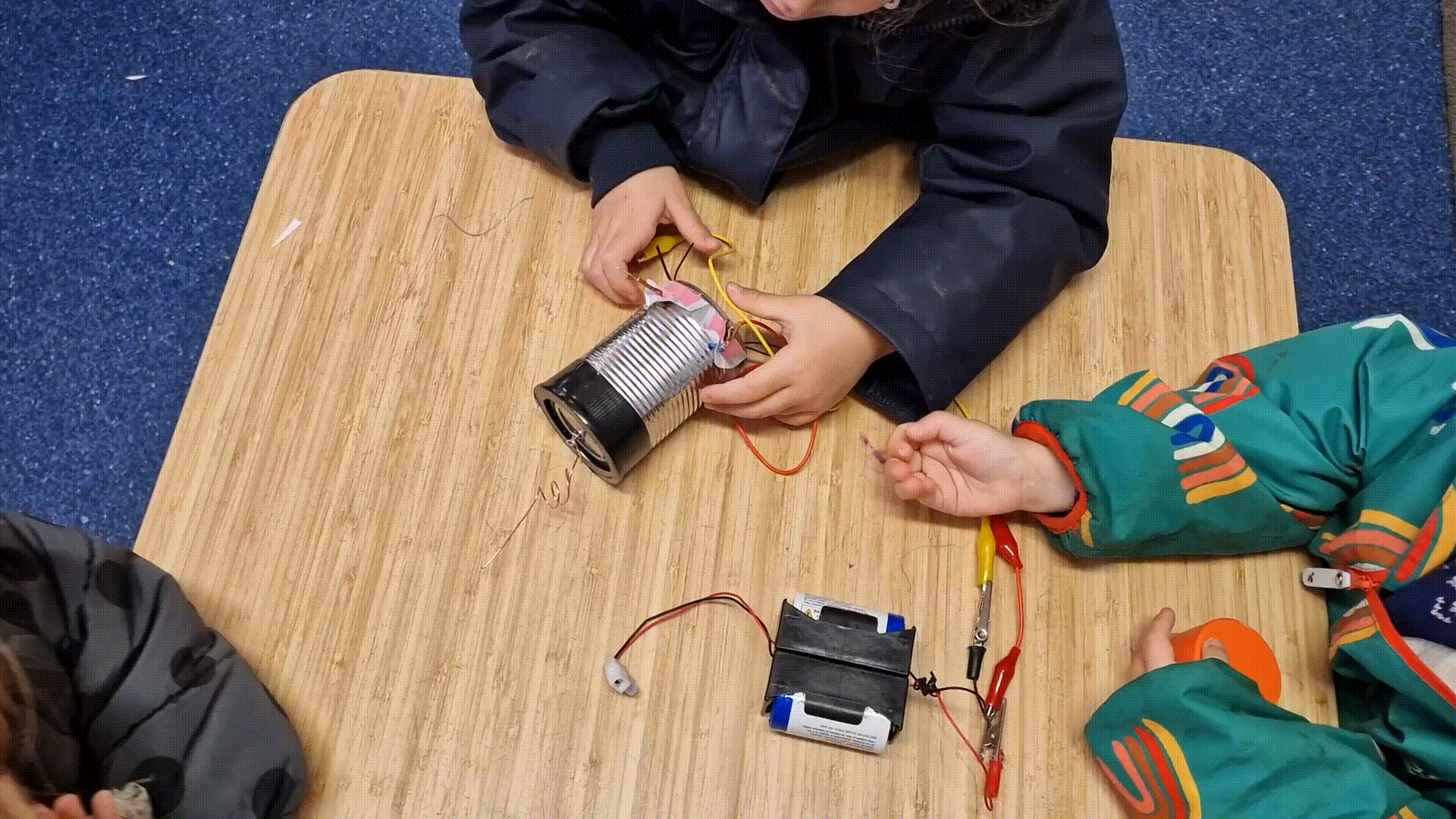The Montessori Method
Children learn in different ways and the classroom is set up to allow for this. The teacher acts as a guide, understanding each child’s requirements and interests and leading them appropriately. A teacher will ensure that your child participates in the whole environment over time, challenging them and stimulating their curiosity in all areas (not just those to which they initially gravitate).
Such work is either done individually or in small groups. This ensures that children gain the help and confidence they need to undertake new challenges. Children can repeat activities whenever they like, developing their skills and making their own choices, developing their abilities to think critically about the world around them.
In a Montessori classroom, you will see many kinds of learning: a child concentrating very hard on an activity that they chose themselves; a group of children role-playing; a small group working with a teacher; preparing a snack and eating at the table with some friends; a group organizing a ‘show’ for whoever wants to watch; or working individually with a teacher who is presenting a new activity with just the right level of challenge.
This method of teaching nurtures children’s independence and drive and really does result in children whose appetite for new activities and new learning appears endless. Each child has a tailored learning plan, extending to all the curriculum areas. A key worker plans for their key children dependent on their starting point and interests.
An individual child, in a day, might choose to: play outside or inside. They will work with their key worker and other teachers in small groups or one to one, they will create imaginative games with their friends, they might make a den, learn about science and geography, create a picture using leaves from the garden, set up for lunch or snack, and help to prepare the food and drinks for their friends. There will always be a large element of child led activities, which increases your childs ability to think for themselves, and develop the ability to have independent and unique thoughts, which the world will always need!
The classroom is divided into carefully curated and beautifully presented curriculum areas:
The practical life area has activities that help refine the critical fine-motor skills that children will need before they can start to write. Other activities, such as making their own snack, buttoning up shirts, and polishing their shoes, practice washing a large model set of teeth, help improve their independence in everyday tasks. The area has many familiar activities from the home to help them feel confident and comfortable. Here, the children also learn to care for and respect their environment, and ultimately, the world around them.
The sensorial area helps the children explore the world through their senses. They investigate different textures, both in and out of the classroom: soft moss, rough stone, a smooth leaf. They match different smells using perfumes and spices. The area also gives them a foundation for maths as they use materials to study volume and size, quantity and length. Through these materials, they are learning to categorize, sort and classify.
Children acquire maths once they have understood the relationship between quantity (the concrete) and numeral (the abstract). All early maths material is designed to achieve a deep understanding of quantity. Once that has been achieved, further material allows the child to associate the abstract numeral, say “3”, with its concrete equivalent: three counters, three stones. Many of the activities are designed to be done collaboratively; practising addition by setting up a shop or a bank, with the activity centred on role-play, making it lots of fun.
The communication, language and literacy area is there to encourage communication, expand the child’s vocabulary and allow their innate love of books to flourish. The early language and literacy games, which children can play from their very first day in nursery, are primarily designed to train children’s ears to distinguish sounds: to know the difference between c, a, t and, subsequently, to be able to blend these newly found sounds into words. Once they have that skill, children learn to read and write quickly using the full range of the more advanced Montessori literacy equipment.
Understanding the world is designed to educate the children about the wider world. They begin to understand their geographic place in the world, and love to learn about life cycles of animals and insects. Your child is encouraged to learn about the different animals from each continent, and we joyfully celebrate festivals from all over the world, which teaches understanding, mutual respect and tolerance for all.
The personal, social and emotional development section of the curriculum is not an area of the classroom but rather is taught through love, example and repetition. We help children to develop self-esteem, self-awareness and confidence. We teach them how to interact constructively with others, especially if they are wanting to express a grievance; to negotiate, and to care for their friends, the classroom, their home environment and ultimately, the world.
Creativity underpins, and reinforces, all the other curriculum areas. It is vitally important, not only in assisting children with their maths and literacy but also in helping them to think, tackle problems and interact. Giving children extensive opportunity for creative expression helps to build their social skills (role-play), their confidence (singing, dancing and role play, expressing thoughts during circle time), speaking and listening skills, motor skills (craft, painting, music, dancing) and their ability to solve problems. Most importantly, it teaches children that they are unique and the way they express themselves is unique to them and we celebrate that!
Outdoor activities develop the child’s holistic wellbeing. Our huge garden offers many opportunities to get physically active, to joyfully extend all areas of learning in the fresh air, to learn about the natural world, grow vegetables, partake in forest school sessions and watch the seasons as they change, using natures bounty in their art and role play.
We are also great adventurers and take children to visit areas of interest when it is COVID safe.
STEM The overarching principles of science, technology, engineering and maths permeate our offering, as we believe strongly that children learn to “decode” their world in the first 5 years of life, and giving them a strong understanding of how things work in that world enables them to develop the problem solving skills required to creatively meet the demands that their life and the future will bring.
Such work is either done individually or in small groups. This ensures that children gain the help and confidence they need to undertake new challenges. Children can repeat activities whenever they like, developing their skills and making their own choices, developing their abilities to think critically about the world around them.
In a Montessori classroom, you will see many kinds of learning: a child concentrating very hard on an activity that they chose themselves; a group of children role-playing; a small group working with a teacher; preparing a snack and eating at the table with some friends; a group organizing a ‘show’ for whoever wants to watch; or working individually with a teacher who is presenting a new activity with just the right level of challenge.
This method of teaching nurtures children’s independence and drive and really does result in children whose appetite for new activities and new learning appears endless. Each child has a tailored learning plan, extending to all the curriculum areas. A key worker plans for their key children dependent on their starting point and interests.
An individual child, in a day, might choose to: play outside or inside. They will work with their key worker and other teachers in small groups or one to one, they will create imaginative games with their friends, they might make a den, learn about science and geography, create a picture using leaves from the garden, set up for lunch or snack, and help to prepare the food and drinks for their friends. There will always be a large element of child led activities, which increases your childs ability to think for themselves, and develop the ability to have independent and unique thoughts, which the world will always need!
The classroom is divided into carefully curated and beautifully presented curriculum areas:
The practical life area has activities that help refine the critical fine-motor skills that children will need before they can start to write. Other activities, such as making their own snack, buttoning up shirts, and polishing their shoes, practice washing a large model set of teeth, help improve their independence in everyday tasks. The area has many familiar activities from the home to help them feel confident and comfortable. Here, the children also learn to care for and respect their environment, and ultimately, the world around them.
The sensorial area helps the children explore the world through their senses. They investigate different textures, both in and out of the classroom: soft moss, rough stone, a smooth leaf. They match different smells using perfumes and spices. The area also gives them a foundation for maths as they use materials to study volume and size, quantity and length. Through these materials, they are learning to categorize, sort and classify.
Children acquire maths once they have understood the relationship between quantity (the concrete) and numeral (the abstract). All early maths material is designed to achieve a deep understanding of quantity. Once that has been achieved, further material allows the child to associate the abstract numeral, say “3”, with its concrete equivalent: three counters, three stones. Many of the activities are designed to be done collaboratively; practising addition by setting up a shop or a bank, with the activity centred on role-play, making it lots of fun.
The communication, language and literacy area is there to encourage communication, expand the child’s vocabulary and allow their innate love of books to flourish. The early language and literacy games, which children can play from their very first day in nursery, are primarily designed to train children’s ears to distinguish sounds: to know the difference between c, a, t and, subsequently, to be able to blend these newly found sounds into words. Once they have that skill, children learn to read and write quickly using the full range of the more advanced Montessori literacy equipment.
Understanding the world is designed to educate the children about the wider world. They begin to understand their geographic place in the world, and love to learn about life cycles of animals and insects. Your child is encouraged to learn about the different animals from each continent, and we joyfully celebrate festivals from all over the world, which teaches understanding, mutual respect and tolerance for all.
The personal, social and emotional development section of the curriculum is not an area of the classroom but rather is taught through love, example and repetition. We help children to develop self-esteem, self-awareness and confidence. We teach them how to interact constructively with others, especially if they are wanting to express a grievance; to negotiate, and to care for their friends, the classroom, their home environment and ultimately, the world.
Creativity underpins, and reinforces, all the other curriculum areas. It is vitally important, not only in assisting children with their maths and literacy but also in helping them to think, tackle problems and interact. Giving children extensive opportunity for creative expression helps to build their social skills (role-play), their confidence (singing, dancing and role play, expressing thoughts during circle time), speaking and listening skills, motor skills (craft, painting, music, dancing) and their ability to solve problems. Most importantly, it teaches children that they are unique and the way they express themselves is unique to them and we celebrate that!
Outdoor activities develop the child’s holistic wellbeing. Our huge garden offers many opportunities to get physically active, to joyfully extend all areas of learning in the fresh air, to learn about the natural world, grow vegetables, partake in forest school sessions and watch the seasons as they change, using natures bounty in their art and role play.
We are also great adventurers and take children to visit areas of interest when it is COVID safe.
STEM The overarching principles of science, technology, engineering and maths permeate our offering, as we believe strongly that children learn to “decode” their world in the first 5 years of life, and giving them a strong understanding of how things work in that world enables them to develop the problem solving skills required to creatively meet the demands that their life and the future will bring.
HoursM-F: 8am - 6pm
|
Telephone020 8670 3363
07368 587208 |
|


